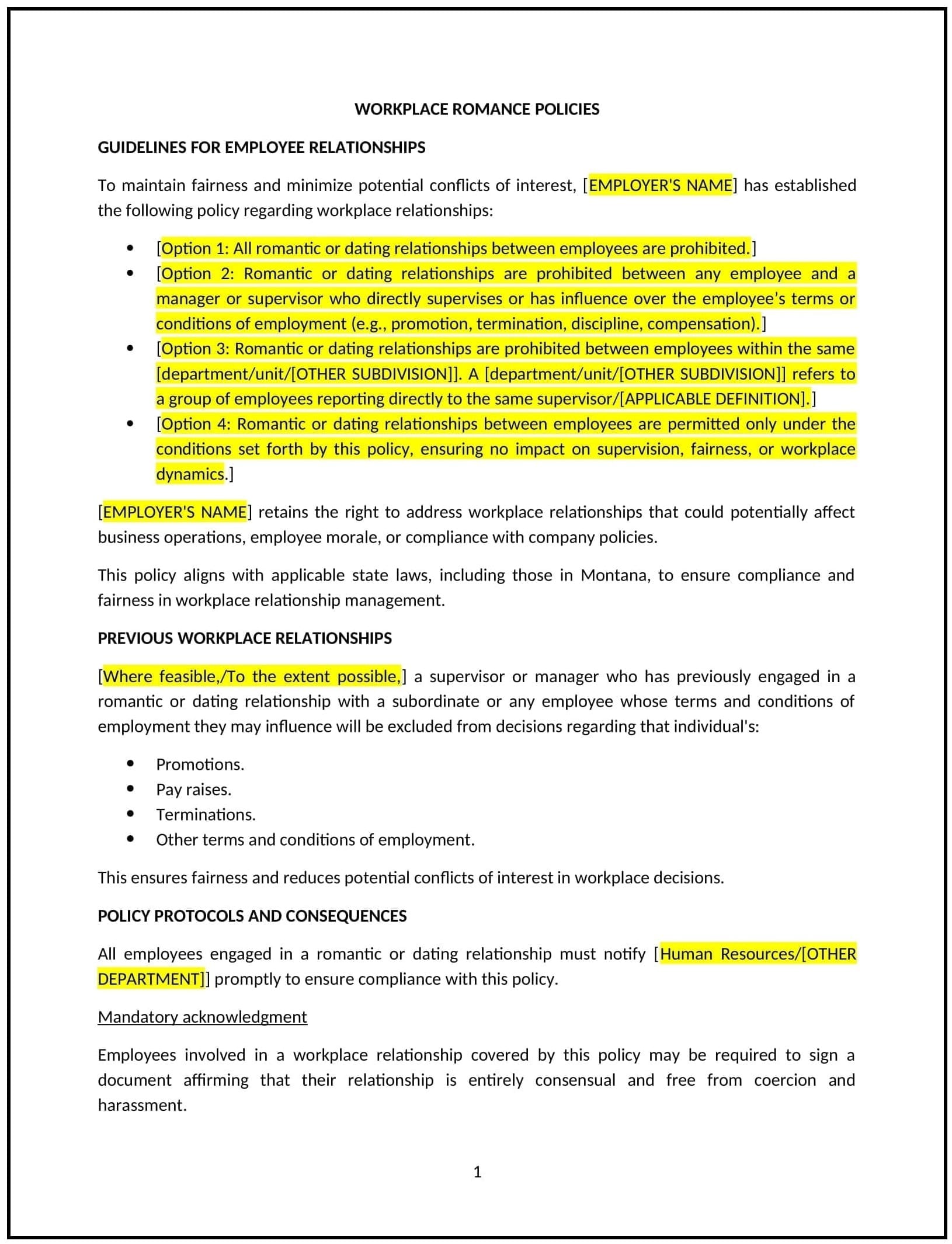Got contracts to review? While you're here for policies, let Cobrief make contract review effortless—start your free review now.

Customize this template for free
Workplace romance policy (Montana)
A workplace romance policy helps Montana businesses address the potential risks and challenges associated with romantic relationships between employees. This policy outlines the company’s stance on workplace romances, including guidelines for disclosure, potential conflicts of interest, and the steps that should be taken to maintain professionalism and avoid issues related to favoritism, harassment, or conflicts.
By implementing this policy, businesses can create a clear framework for handling romantic relationships in the workplace, promote a respectful environment, and mitigate the risks that could arise from these relationships.
How to use this workplace romance policy (Montana)
- Define workplace romance: The policy should specify what constitutes a workplace romance, including relationships between colleagues, supervisors and subordinates, or between employees and clients/vendors.
- Set disclosure requirements: The policy should outline when and how employees should disclose romantic relationships, particularly when one party holds a supervisory role over the other or there could be a potential conflict of interest.
- Address conflicts of interest: The policy should specify how potential conflicts of interest will be managed, including steps to ensure that relationships do not result in favoritism or unequal treatment within the team.
- Set expectations for professionalism: The policy should emphasize that workplace romances should not interfere with work performance, team dynamics, or the overall work environment. Employees should continue to behave professionally and respectfully regardless of personal relationships.
- Provide guidelines for supervisory relationships: The policy should establish clear rules for relationships between supervisors and subordinates, which may include reassignment of reporting lines or roles to avoid potential conflicts or perceptions of favoritism.
- Outline consequences for policy violations: The policy should specify the consequences for failing to disclose a relationship or for engaging in behavior that disrupts the workplace, including possible disciplinary action.
- Review and update regularly: The policy should be reviewed periodically to ensure it remains aligned with company goals, legal requirements, and evolving social norms.
Benefits of using this workplace romance policy (Montana)
This policy provides several key benefits for Montana businesses:
- Reduces conflicts of interest: By setting clear rules for disclosure and managing relationships, businesses can minimize the risk of favoritism, unequal treatment, or conflicts of interest that could undermine team dynamics or employee morale.
- Promotes a respectful work environment: A workplace romance policy helps maintain a professional atmosphere by outlining expectations for respectful behavior, even when personal relationships are involved.
- Protects the company from liability: Having a clear policy in place can help businesses avoid potential legal claims related to harassment, discrimination, or retaliation that could arise from workplace romances.
- Ensures transparency: By requiring employees to disclose relationships, businesses can maintain transparency and fairness in managing relationships that may affect the workplace.
- Supports employee well-being: Clear guidelines for managing relationships in the workplace can help employees navigate romantic relationships without fear of jeopardizing their careers or facing negative consequences.
- Enhances company reputation: A workplace that is seen as having a fair and professional approach to managing workplace romances is more likely to attract and retain talented employees who value a respectful and balanced environment.
Tips for using this workplace romance policy (Montana)
- Communicate the policy clearly: Ensure that all employees are aware of the workplace romance policy, including when and how to disclose relationships, the expectations for behavior, and the potential consequences for non-compliance.
- Encourage transparency: Employees should be encouraged to disclose relationships early, particularly when there is a supervisory relationship or a potential conflict of interest, to ensure that any issues can be managed appropriately.
- Foster a respectful work environment: Emphasize that personal relationships should not affect the professional environment, and employees should continue to adhere to the company’s code of conduct and performance expectations.
- Be consistent in enforcement: Ensure that the policy is applied consistently to all employees, regardless of their role or seniority, to avoid perceptions of favoritism or bias.
- Review relationships on a case-by-case basis: Each romantic relationship may present unique challenges. Review situations individually to determine whether any adjustments or accommodations need to be made, such as reassignment of roles or reporting lines.
- Review the policy periodically: Regularly review the policy to ensure it remains relevant and addresses emerging concerns related to workplace dynamics, legal requirements, and evolving social norms around relationships.